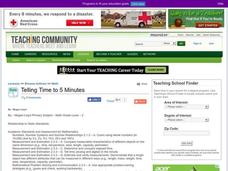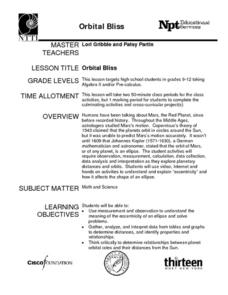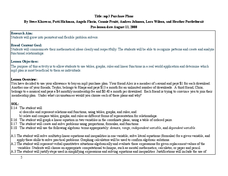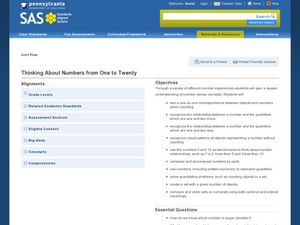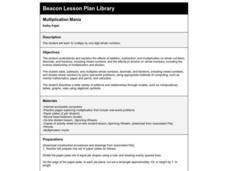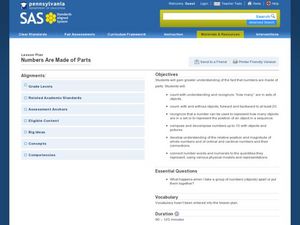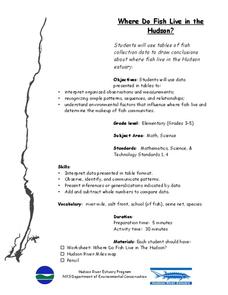Curated OER
Shaping Up!
Kindergartners are introduced to basic shapes. Learners spend 45 minutes a day in geometry centers carrying out the activities outlined in this ambitious plan. There are games, hands-on activities, interactive websites, art projects,...
Curated OER
Telling Time to 5 Minutes
In this second grade lesson your class will practice telling time. The goal is to tell time to five minutes using an analog clock. Your young students count by 5 minute intervals and discuss elapsed time.
Curated OER
Understanding 10: Backwards and Forwards
Help your young mathematicians completely master 10 by practicing one-to-one correspondence, number recognition, and recording numbers displayed. They make 10 with groups of two-different colored cubes and color in 10-frames to show how...
Curated OER
Equivalent Fractions
If you are looking for a simple way to review equivalent fractions, this is a great resource. Using a visual means and a series of examples, learners review this skill. There is a worksheet provided and a prompt to encourage pupils to...
Curated OER
Orbital Bliss
Most young mathematicians are aware that the planets don’t orbit the sun in a circle but rather as an ellipse, but have never studied this interesting feature. This resource looks at the planetary orbits in more detail and helps learners...
Curated OER
Impossible Graphs
Students practice plotting functions on the Cartesian coordinate plane while participating in a discussion about the Possible Or Not worksheet/activity. Students also use the Impossible Graphs worksheet to practice reading a graph,...
Curated OER
Graphs and Functions
Use this series of activities to introduce learners to graphing functions. They graph both linear and quadratic equations by hand and with a Graph Sketcher Tool. Several imbedded links and handouts are included in the lesson.
Curated OER
MP3 Purchase Plans
Use algebra to solve real world problems. Mathematicians practice use of graphs, tables, and linear functions to solve a problem regarding mp3 purchase plans. They work in groups to solve the problem and present their findings and...
Curated OER
Exploring Exponential Growth and Decay Functions
Students differentiate between exponential growth and decay. In this algebra lesson, students solve exponential equations using properties of exponents. They use the Ti calculator to graph and analyze their functions.
Pennsylvania Department of Education
Thinking About Numbers from 1 to 20
Help your kindergarteners discover new number-sense concepts and to compose and decompose numbers. Though the resource contains no procedural details, the assessment tool (which you can find in the "printer friendly version") has...
Curated OER
Box Plots
Young statisticians are introduced to box plots and quartiles. They use an activity and discussion with supplemental exercises to help them explore how data can be graphically represented.
Curated OER
How Alike Are We?
Fourth graders find the range, mode, median, and mean for each of the data sets (height and shoe size). They discuss which measure of central tendency for each data set best represents the class and why. Students graph the shoe size and...
Curated OER
Application and Modeling of Standard Deviation
The first activity in this resource has learners computing the mean and standard deviation of two different data sets and drawing conclusions based on their results. The second activity has them using a dice-rolling simulation to...
Curated OER
Cylinders and Scale
Students review what a cylinder is and how a cylinder is measured. They build a variety of cylinders with different heights and radii. They compare the surface area and volume of each cylinder and discuss anything that surprises them...
Curated OER
Reflection on Educational Goal Setting and Self-Assessment
Third graders evaluate their performance at school. They examine their most recent spelling test scores to determine whether or not they met their goals for the test.
Pennsylvania Department of Education
Numbers Are Made of Parts
Children play with barnyard animal cards to practice composing and decomposing numbers. With their "secret number" of animal cards in a cup, they shake and spill them onto a barn story board, counting how many animals fall in the barn...
Curated OER
Complexity Madness
Discuss different techniques for finding the area of a geometric shape, with a great visual guide. Using a real life example, learners calculate the area of a rectangle and a square.
Mary Pope Osborne, Classroom Adventures Program
Mummies in the Morning Egyptian pyramids, hieroglyphics
Visit the Magic Treehouse and take your class on a trip through time with a reading of the children's book Mummies in the Morning. Using the story to spark an investigation into Egyptian culture, this literature unit engages...
Curated OER
Get a Leg Up
Traveling through space is an amazing experience, but it definitely takes a toll on the body. After reading an article and watching a brief video, learners perform an experiment that simulates the effects of zero gravity on the...
Curated OER
Counting By 5s
Second graders count by 5's to 100. In this math lesson conducted on the 100th day of school, 2nd graders use picture stamps in the KidPix program to count by 5's and get to 100.
Curated OER
Reno's Dilemma
Students explain proportions as it relates to principle and interest. They use proportions to explain relationships and analyze relationships by identifying patterns.
Curated OER
Where Do Fish Live in the Hudson?
Students explore the environmental factors that influence where fish live and determine the makeup of fish communities in the Hudson. They interpret guided observations and measurements to assess patterns, sequences and relationships.
Curated OER
Irregular Fractals
Middle schoolers study and research irregular fractals and construct a few based on their research. Students practice pattern recognition skills and plane geometry skills calculating dimensions on the Fractured Pictures activity.

